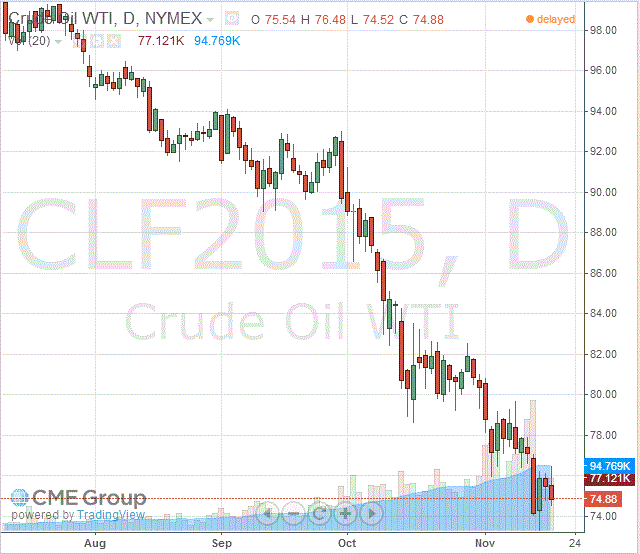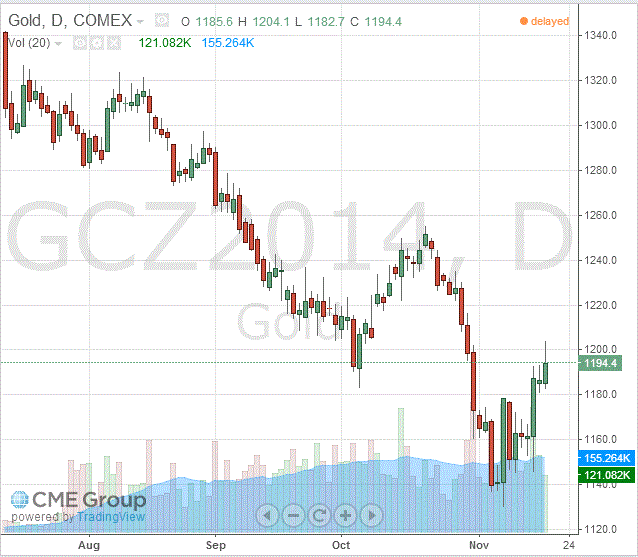Notícias do Mercado
-
16:40
Oil: an overview of the market situation
Oil prices fell today, fixing at this sixth drop in the last seven trading sessions, due to the uncertainty regarding the decision of OPEC.
Lately, there are more speculation that during the meeting the organization of Petroleum Exporting Countries will not reduce output to support prices. Add oil ministers of Saudi Arabia and Kuwait are against reducing production, while Libya, Venezuela, Ecuador and insist on taking measures to prevent a further fall in prices.
"The probability of reducing the OPEC production is approaching 50 percent. Trips of several participants indicate an active preparatory work on the eve of the meeting, "- said the analyst A / S Global Risk Management Michael Poulsen.
Recall OPEC oil ministers scheduled a meeting in Vienna on November 27 during which intend to consider the advisability of adjusting current output at 30 million barrels per day at the beginning of 2015.
Pressure on prices has also had a decision of the Prime Minister of Japan Shinzo Abe to dissolve parliament and hold early elections, according to the auction. Japanese Prime Minister Shinzo Abe on Tuesday held a press conference at which he stated that on November 21 dissolve the parliament to hold early elections. However, he did not mention the exact date of the elections. Japanese media converge on the fact that the vote will likely take place on December 14th.
In addition, Abe said that he suspended unpopular program of increasing the consumption tax. The second phase of the program: the increase of the tax rate from 8% to 10%, will be delayed by 18 months to October 2015. The first phase, held in April, is considered one of the main causes of the current economic recession in Japan. However, Prime Minister promised that this postponement will be the first and last. He believes that he can create the conditions that will increase the tax in April 2017.
Meanwhile, traders are awaiting the release of fresh US data on stocks of crude oil and refined products to gauge the strength of demand in the world's largest oil consumer. According to forecasts, the government report will show that crude oil reserves fell by 1.2 mln. Barrels in the week ended November 14th.
Cost January futures on US light crude oil WTI (Light Sweet Crude Oil) fell to 74.88 dollars a barrel on the New York Mercantile Exchange.
January futures price for North Sea petroleum mix of mark Brent fell $ 0.52 to $ 78.56 a barrel on the London exchange ICE Futures Europe.
-
16:20
Gold: an overview of the market situation
Gold prices rose today, reaching a peak at the same time in two weeks, which was associated with the weakening of the US currency.
"Fluctuations in the dollar remains the main factor for the gold, and the periods of significant growth is mainly the result of short covering. Support appears to be $ 1181-1182 and resistance - for $ 1,200, "- said a trader MKS Capital James Gardiner.
Marked influence exerted by German data show that economic sentiment rose for the first time this year in November, after a negative value in the previous month, beating economists' expectations. Indicator of economic sentiment rose to 11.5 ZEW from -3.6 in October. Economists had expected a slight improvement in the index to 0.9. The result was the highest in the past four months. The current conditions index rose to 3.3 from 3.2 in the previous month. Economists had forecast the index falling to 1.7. Economic sentiment index for the euro area rose by 6.9 points to 11 in November. The index of current conditions in the region, meanwhile, fell by 2.9 points to -59.7. "The recent growth figures for the euro area suggest that the economy is stabilizing, which contributed to an increase in the indicator. Nevertheless, the economic situation remains fragile, not least because of the continuing geopolitical tensions, "- said ZEW President Clemens Fuest.
The course of trading also influenced expectations that the European Central Bank may start buying up assets, including gold, to deal with low inflation. Speaking before the Committee on Economic and Monetary Affairs of the European Parliament on Monday, ECB President Mario Draghi said the bank's unconventional stimulus measures may include the purchase of various types of assets. According to board member Yves Mersch ECB, in theory, the Central Bank may begin to buy government bonds, gold, ETF, and even property to avoid a long period of low inflation.
Meanwhile, it was reported that the world's largest reserves of the gold-traded exchange-traded fund SPDR Gold Trust on Monday rose by 0.33% to 723.01 tons, marking the first increase since November 3.
The cost of December gold futures on the COMEX today rose $ 10.9 to 1194.40 dollars per ounce.
-
11:25
Oil: trading higher
Oil prices climbed in today's session with Brent Crude trading +0.21% at USD79.48 a barrel and WTI Crude being traded at a plus of +0.48% at USD76.00 still being quoted close to four-year low. Oil ministers from Iran, Libya, Venezuela, Ecuador and Algeria were demanding to cut output but Saudi Arabia and Kuwait still resist to lower production.
-
11:10
-
00:01
Commodities. Daily history for Nov 17’2014:
(raw materials / closing price /% change)
Light Crude 75.47 -0.22%
Gold 1,186.60 +0.26%
-


